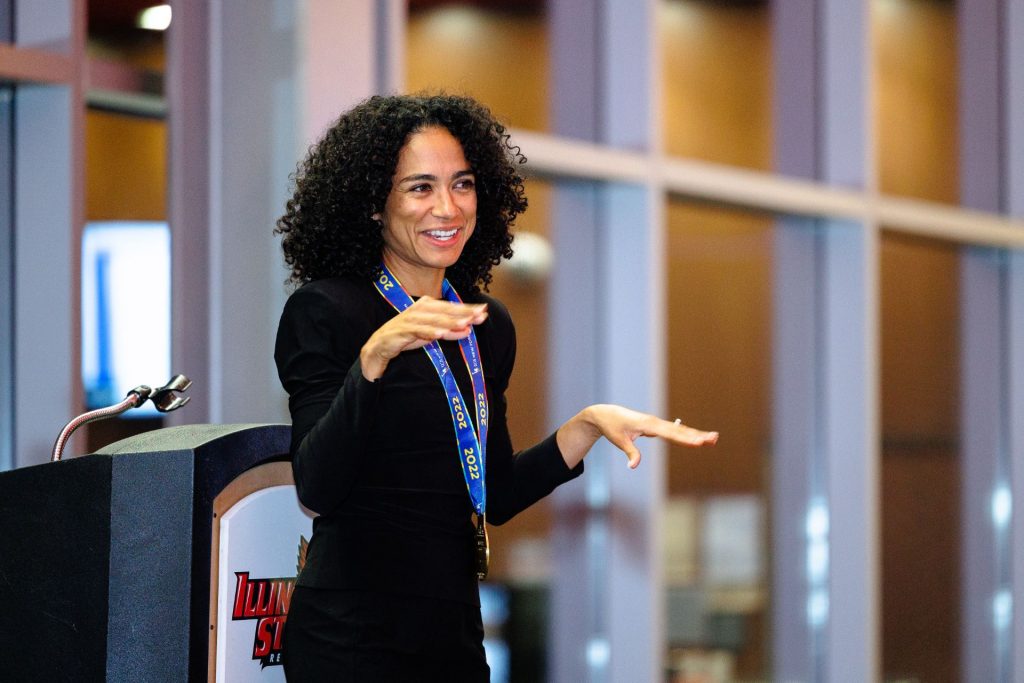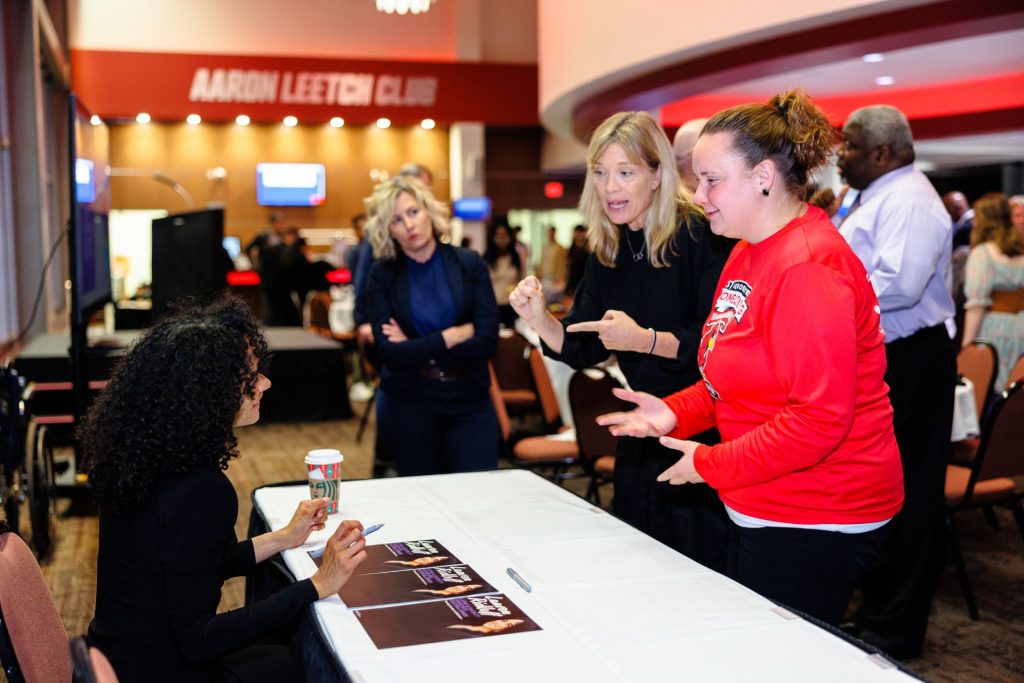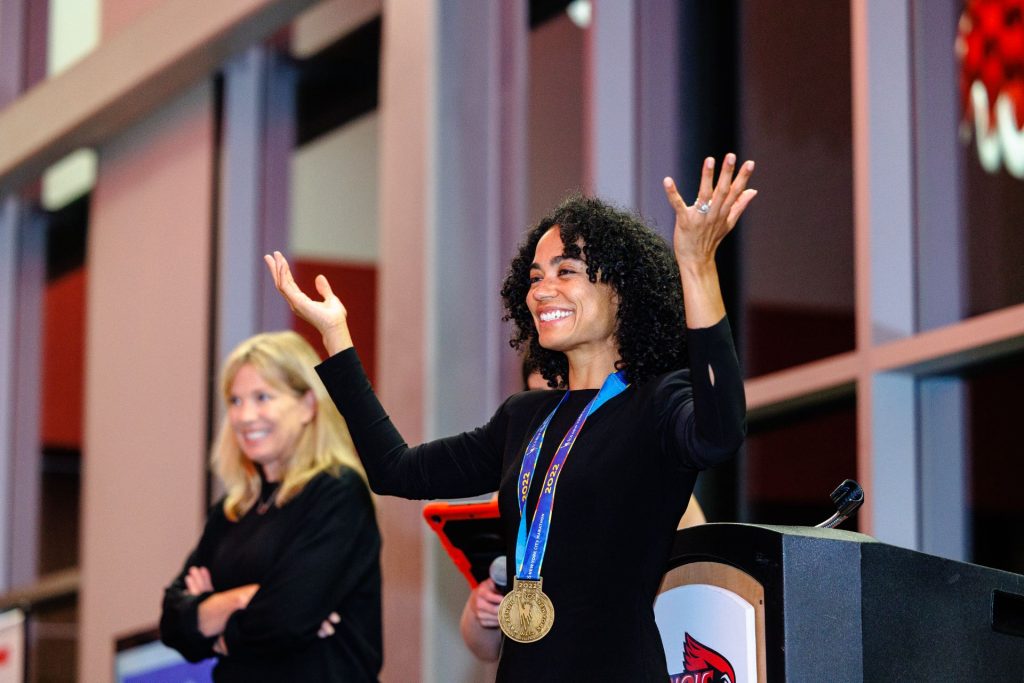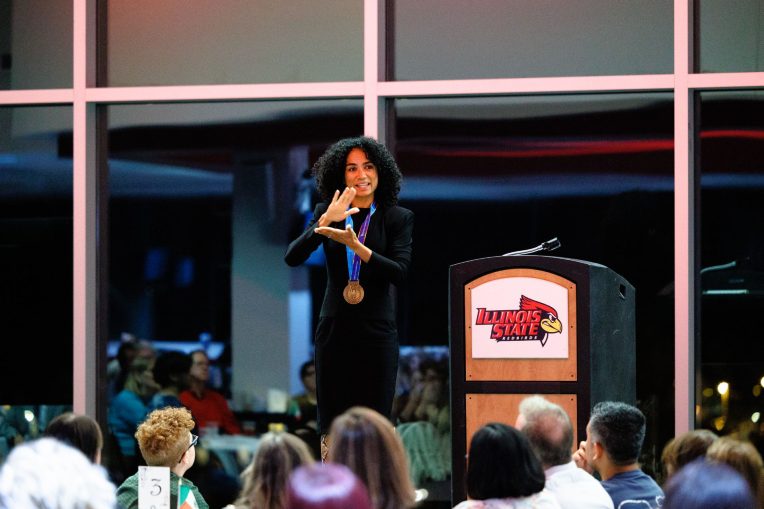When faced with deciding whether to pursue an acting career in Hollywood or return to the New York City school where she loved teaching for nearly a decade, Lauren Ridloff considered advice from a friend.
“Give it a year. Give acting a try,” they told her. “And if nothing happens, go back to PS 347 (the American Sign Language and English Lower School).”
Fresh off her breakthrough, Tony-nominated lead performance as Sarah Norman in the 2018 Broadway play Children of a Lesser God, Ridloff began submitting television audition tapes.
She was subsequently cast as Connie, a series regular in AMC’s The Walking Dead. She earned guest-star roles in the CW’s Legacies and NBC’s New Amsterdam. And she was approached by Marvel Studios to star in the film Eternals as Makkari, Marvel’s first deaf superhero.

“All of that happened within a year. Not bad for a PS 347 teacher, from Chicago—Deaf, Black, Mexican. Not bad,” Ridloff said.
Ridloff discussed her intersecting identities November 10 for a sellout crowd in the Aaron Leetch Stadium Club as the keynote speaker for Illinois State’s Latino and Disability Awareness Cultural Dinner. She presented her talk using American Sign Language (ASL), which was interpreted into spoken English.
Before she was an actor, Ridloff taught kindergarten and first grade for nine years at PS 347, a dual-language school dedicated to bridging the Deaf and hearing communities in New York City. Each class includes deaf students, hard of hearing students, children of deaf adults (CODAs), and hearing students who learn ASL. Classes are co-taught by a native ASL user and a native English speaker.
On November 6, she completed the New York City Marathon—her first marathon—as part of a team that raised nearly $50,000 to support PS 347 students, many of whom come from diverse, underserved families. Ridloff said the money will help provide more food options for students, pay for student transportation, and encourage an expanded school theater program.
“That school is so extraordinary,” Ridloff said
Ridloff’s transition from teaching to acting was unexpected. After leaving PS 347 to raise her two sons, Ridloff was hired to tutor director Kenny Leon in ASL for an hour each week. He was producing a revival of the 1980 play Children of a Lesser God, which focuses on the complex relationship between an unconventional speech therapist and a deaf cleaning woman, Sarah Norman. The speech therapist attempts to teach Sarah how to speak and read lips in a romantic journey that explores “classism, sexism, and ableism,” according to Ridloff.
During the play’s table read—when actors gather to read through the script—Leon asked Ridloff to read for the uncast lead role of Sarah. By agreeing to participate in the table read, Ridloff, who stopped using her voice when she was 13 years old because people were associating her speech ability with her intelligence, had to use her voice for the first time in about 25 years to exclaim: “Speech. Is that it? Is this what you want?”
“I had to do it,” Ridloff said. “I had to tell the story of Sarah. It was important.”

When Ridloff finished her culminating line, there was silence in the room. Actor Joshua Jackson, the speech therapist, was tearing up. In that moment, Leon pulled Ridloff aside and asked, “If this moves onto Broadway, are you in?” Ridloff replied, “Of course.”
Children of a Lesser God ran for nearly seven weeks on Broadway, and during that time, Ridloff felt compelled to pursue a career in acting.
“It was scary,” Ridloff said. “The burning question that I had for myself was, ‘Does Hollywood have space for someone like me?’ I’m so wildly specific, and marginalized. ‘Does Hollywood have space for somebody who is Deaf, Black, Mexican?’”
Ridloff said her success in landing roles on The Walking Dead and in Marvel’s Eternals has shown her that “Hollywood is starting to have increased awareness about being in the Deaf community.”
Being a member of the “amazing, diverse” cast of the Eternals helped Ridloff connect with fellow actors who share intersectional identities, such as Mexican and Lebanese actor Salma Hayek.
“She taught me that how we choose to identify ourselves truly is a personal choice,” Ridloff said. “I felt validated. It is OK to feel different about my identities. It all depends on context: Where I’m at; what I’m going through; my experience as a Deaf person, as a Black person, and as a Mexican person. It’s just a part of who I am. It’s an intersection. It all comes together. One identity colors another identity.”

Throughout the Eternals’ extensive press tour, Ridloff said interviewers focused primarily on her identity as a deaf superhero. “What’s it like to be Marvel’s first deaf superhero?” she was asked. But Ridloff struggled to find a succinct response.
“It’s not necessarily a bad question,” Ridloff said. “But that question requires a story. I have a lot of story to tell to answer that question within a five minute interview.”
During her talk at Illinois State, Ridloff said she was thinking more about her response.
“Wait, I do have an answer. Just for tonight. Tomorrow, it might be a different answer,” Ridloff said. “But for tonight, ‘How does it feel to be a deaf superhero?’”
Ridloff pulled out her New York City Marathon medal, draped it over her head, and smiled.


